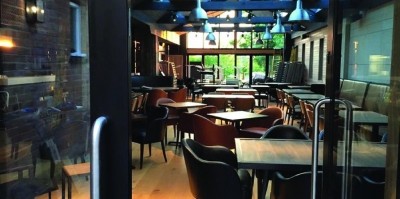The Big Interview: Oakman Inns founder Peter Borg-Neal

Since starting out in the trade as a cellar boy aged 16, Peter Borg-Neal has never looked back in a career that has involved all sides of the industry, leading him to establish the now 14-strong pubco Oakman Inns.
Borg-Neal says his first job in the cellar gave him a “fascination” with the industry, particularly with beer and food, and he quickly made the step up to head barman by the age of 18.
After completing a hotel and catering management course at college, he moved back to the front line, working in a pub kitchen to expand his skill set and satisfy an enduring passion for food.
“I still work a few shifts a year in the kitchen. It’s the job I enjoyed the most,” he tells the Publican’s Morning Advertiser.
Career
1977 - first job in a pub at the Beansheaf, Reading
1979 - became head barman on his 18th birthday
1985 - joined Allied Lyons (later Allied Domecq) as an assistant pub manager
1995 - left Allied having risen to director at Taylor Walker
1995 - owned first pub — the Marquis of Granby near Wendover, Bucks
1998 - sold the business and joined Whitbread
2002 - left Whitbread and launched Italian restaurant Forno Vivo
2004 - sold Forno Vivo to Yates
2006-2008 - worked at Grass Roots as international operations director running offices in New Delhi, Madrid, Dubai and Dublin
2007 - opened the Akeman, Tring, Herts, as the first Oakman Inn
Move to management
“But when I worked there, I found the management really irritating and thought I could do a better job than them, so moved over into management.”
The route to the top Borg-Neal took, including area management, operations director and marketing roles, has inspired him to create a clear career pathway for all employees, with an emphasis on training, rewards and appreciation.
“It helps that I can do any job here. I empathise with our people and I know what it’s like to be under pressure, when the kit doesn’t work, how it is to not be appreciated,” he explains.
“It annoys me that people underrate opportunities in this industry. I want to make sure anyone that joins, has got a talent and is pre-pared to work hard gets an opportunity to progress.
“It would give me a huge amount of pride if I eventually hand over this business to someone who came through from the bottom of it.”
Valued staff
The introduction of the national living wage, of at least £7.20 an hour for workers aged 25 and older, has been welcomed at Oakman Inns, in line with its philosophy of appreciating and rewarding staff.
“I know a lot of colleagues are very upset about the living wage, but I just don’t agree. We need to pay our people more and customers need to pay a tiny bit more when we get it right,” he adds.
Oakman Inns won three Publican Awards in 2015 — Best Employer (2-50 sites), Best Community Operator, and Best New Pub/Bar for the Beech House in St Albans, Hertfordshire. Borg-Neal lists these victories as some of his proudest moments.
“I’m also really proud of our community work. I’m proud when I stand in the corner on a busy evening seeing it all working, customers having fun, staff enjoying themselves. That’s what being successful is all about.”
'I hate to be bored'
Next year will be his 40th in the sector and the acceleration of change has kept Borg-Neal on his on his toes throughout his career.
“I hate to be bored, I can’t bear it, and I certainly never am in this industry,” he says.
And the industry is set to move faster and faster, according to Borg-Neal, particularly in the kitchen, due to the impact of street food.
“Customer expectation is growing — they know you can get something really delicious for not a lot of money now.
“Operators at the value end with low-quality produce and prices might find that things get harder and harder. Slapping something in the microwave or some cheap sauce on a piece of meat won’t quite cut it.”
Inspiration
Borg-Neal admires operators who can deliver quality consistently, not just ‘new fangled ideas’. He notes the impressive work of operators David and Becky Salisbury, at Salisbury Pubs; Anthony Pender at Yummy Pub Co; and Joycelyn Neve at Seafood Pub Company.
“It’s great to see successful women in a sea of dreary middle-aged men like me. It’s important to have inspiration for women in this business,” he says of Neve.
“Competition is getting very strong; it’s a great time to be a customer. You could argue that makes it a bad time to be an operator but it means it’s tougher to be successful — so fight harder.”
Borg-Neal admits it’s been difficult to build a business, fighting through the recession and an era in which banks are reluctant to lend.
'Battle-hardened'
“But you come out battle-hardened. Grow up in a tough area and go through tough times, and you come out a bit harder. We are ready for anything now,” he says.
Though he’s a firm believer that good pubs are likely to overcome adversity and stay open, one area frustrates Borg-Neal endlessly: taxes on food.
He wonders why pub food should be subject to 20% VAT in pubs while supermarkets do not have to pay.
“We are horrendously, unfairly taxed. The VAT machine is ridiculous, beyond stupidity,” he says.
Tax
If he had his way, tax on food in pubs would be scrapped, or at least lowered to 5%, and the money should be recuperated by Government from a tax on processed foods in shops.
This could go much further for pubs than a “pie in the sky” hope of a cut to alcohol tax, he argues.
“Taking VAT off dining would have massive advantages. Young people could afford to eat out — why drink cheap shots in a grotty bar when you can go for a meal and a few drinks?”
He also questions the sense of awarding pubs asset of community value (ACV) status in some situations and would rather see one top-quality pub stay open if it means three struggling venues closed.
Viable businesses
“Keeping one pub open in a re-mote village — I understand that — but why keep a pub open when the licensee is having a miserable existence trying to pay the bills and taking the cream off of a business that is more viable?
“I’m not for pub closures but I’m against artificially stopping closures. ACVs have been used horrifically.”
Borg-Neal has embraced new innovations in pubs that have rapidly become the norm.
“Not having Wi-Fi is a bit like not having toilets now. Anything that’s a good idea sticks around and becomes a core expectation,” he maintains.
Payment apps
And the next thing to look out for is payment apps, he argues.
“I can buy a house or a car online, anything I want. But I wouldn’t go to Amazon with a bag of money. Why are we carrying money? Customers will get served quicker and easier if they use their phone for ID and payment.
“I do want to chat with bar staff, but I don’t want to wait for them to mess around with the machine. The future of consumer feedback will be the same — you have to answer a question when you pay.”
Though Oakman Inns has gained impressive recognition — having been named as the highest-ranked pubco in The Sunday Times’ Best Companies To Work For list two years in a row, there’s still a long way to go to achieve his ambitions.
Borg-Neal hasn’t set a number of how many pubs Oakman Inns can grow to, but his ultimate goal is to make it the “best pub company in Britain”.






